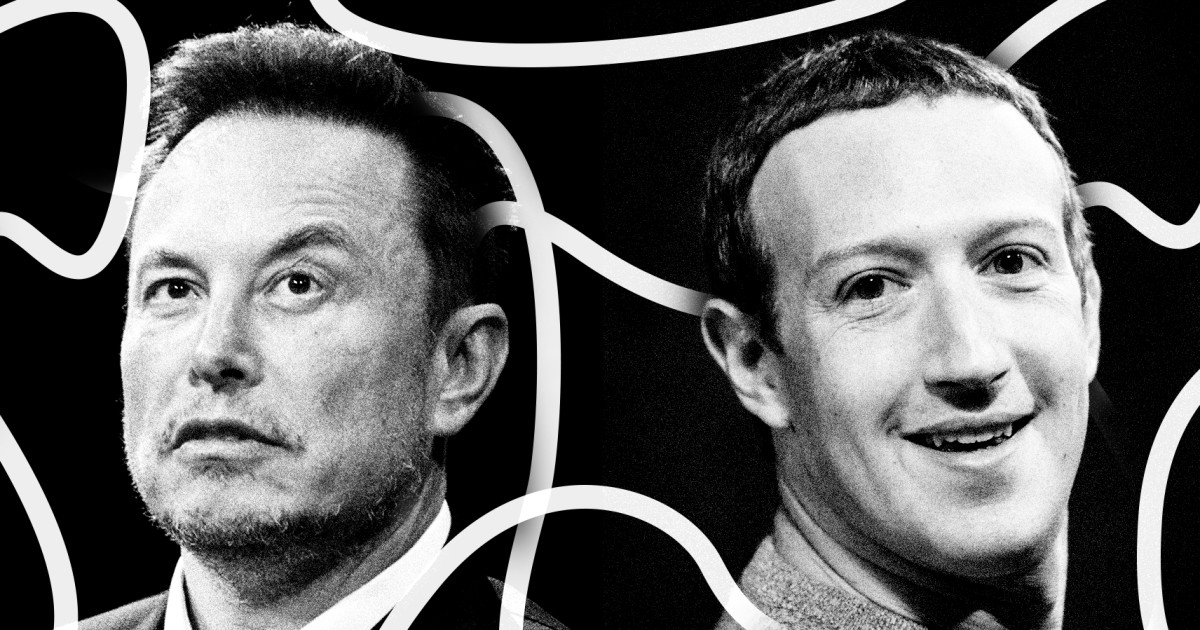
www.nbcnews.com
The (figurative) cage match between Mark Zuckerberg and Elon Musk is on
With the release of Instagram Threads, it seems Mark Zuckerberg and Elon Musk are already going head-to-head as the war between Meta and and Twitter escalates.
Culture & Entertainment
Mark Zuckerberg doesn't tweet. So it was notable when he posted one on Wednesday night — his first in 11 years — not long after Threads, his new Twitter rival, launched.
His choice of meme — two Spidermen pointing at each other — offered plenty to interpret. It could be seen as a nod toward the debut of what is essentially a Twitter clone. It could be seen as him winking at the talk of a cage match between him and Elon Musk — while also acknowledging how Musk's work at Twitter has influenced his own thinking about how to run a tech company.
There is also a broader, simpler way to see the meme: Two titans of tech with plenty of similarities who now find themselves in the tech equivalent of hand-to-hand combat.
“We believe this ongoing beef between Zuckerberg and Musk is getting nastier with the Meta Threads launch,” Dan Ives, a managing director and senior equity research analyst covering the technology sector at Wedbush Securities, a wealth management and financial services company, said in an email. “Zuckerberg sees blood in the water for Twitter and is now looking to gain market share out of the gates with the Threads launch.”
It's a situation that has been brewing for about five years. Zuckerberg and Musk were once in very different businesses — social media versus cars and rockets — and they also occupied very different places in the public discourse.
Questions about Facebook's privacy practices and recommendation systems shifted Zuckerberg's image from that a boyish Harvard business prodigy to the face of growing concern about the unbridled growth of social media and what some called surveillance capitalism.
Musk, meanwhile, was still drawing Tony Stark-as-Iron Man comparisons. Tesla was blazing a path to a greener future, and SpaceX was reinvigorating dreams of putting humans on Mars or even beyond. Oh, and he called Facebook "lame."
That dynamic would begin to shift as their rivarly became more direct, with Musk's acquisition of Twitter proving to be a major turning point.
Growing scrutiny of Musk's business practices combined with his embrace of conservative politicians and politics soured Musk among some of his supporters — and helped him amass a still-growing base of fans on the right.
Musk and others on the right, meanwhile, have sought to paint Zuckerberg as a quiet leftist who swung the election for Joe Biden with hundreds of millions of dollars in donations. The Federal Election Commission unanimously dismissed a complaint about election administration grants from Zuckerberg and his wife, Priscilla Chan, that found "no reason to believe" there was any wrongdoing.
More recently, Musk has openly embraced many of the modern and sometimes fringe causes of the online far right. Zuckerberg has stayed relatively apolitical.
"Zuck and Musk have kind of become proxies for a lot of civic, political, social issues," said Brooke Erin Duffy, an associate professor of communication at Cornell University who studies social media. "And I feel like the conversations that I've seen, it's been in some ways that Zuckerberg and Meta are the lesser of two evils."
And though an actual cage match fight may not actually happen, what might have been more of a personal rivalry turned undoubtedly professional once Musk bought Twitter.
Twitter seems to agree. A lawyer for Musk sent a cease-and-desist letter to Zuckerberg dated Wednesday alleging that Meta "has engaged in the systematic, willful and unlawful misappropriation of Twitter's trade secrets and other intellectual property" and that the company hired former Twitter employees to build Threads. A Facebook spokesperson denied that any Facebook engineers working on Threads previously worked at Twitter.
Business tends to breed rivalries, and tech has been no different. The well-documented relationship between Apple co-founder Steve Jobs and Microsoft co-founder Bill Gates featured a series of ups and downs. Gates and Jobs did business together before becoming fierce critics of each other, though they would also occasionally intersperse a compliment or two.
Zuckerberg's recent comments on Lex Fridman's podcast were the closest either Zuckerberg or Musk have come to expressing anything resembling admiration, primarily around making Twitter "leaner." Both Twitter and Facebook have had multiple rounds of layoffs.
Zuckerberg might be more apt to offer kind words to Musk considering the dynamics between them. Musk's deal to buy Twitter and subsequent management have fueled questions about the future of the platform.
But the business stakes for both of them don't appear to be that high.
William Cohan, a journalist and former investment banker, recently wrote for the media outlet Puck that there's a way Musk loses control of Twitter altogether if the people who hold the company's debt put the company into an involuntary bankruptcy proceeding.
But Cohan noted in a phone interview that even with Twitter's struggles, Musk's net worth has grown sharply in 2023. Tesla stock, which accounts for much of Musk's riches, is up 150% this year.
Meta has had its own ups and downs, and while Threads is a hit, it's still a small part of its broad array of businesses. Its shares are up about 134% this year, and the company is worth about $748 billion.
So what are the stakes? Maybe it's more about legacy. Though Zuckerberg's public persona hasn't changed considerably in recent years, Musk's has. And so without Zuckerberg doing much, some people suddenly find themselves rooting for him.
"Here's the ultimate irony: Elon Musk has made Mark Zuckerberg into a quasi-sympathetic figure," Cohan said.
Cage or not, the fight is on.
























































